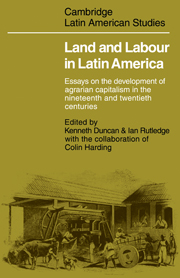 Land and Labourin Latin America
Land and Labourin Latin America Book contents
- Frontmatter
- Contents
- List of tables
- List of figures
- List of maps
- Acknowledgements
- 1 Introduction: patterns of agrarian capitalism in Latin America
- PART I THE TRANSITION FROM TRADITIONAL HACIENDA TO CAPITALIST ESTATE
- PART II THE DEVELOPMENT OF A PLANTATION ECONOMY WITH LABOUR RECRUITMENT FROM HIGHLAND PEASANT COMMUNITIES
- PART III THE DEVELOPMENT OF COMMERCIAL AGRICULTURE USING EUROPEAN IMMIGRANT LABOUR
- PART IV THE TRANSITION FROM SLAVE PLANTATION TO CAPITALIST PLANTATION
- PART V POSTSCRIPT
- Glossary of Spanish and Portuguese terms used in the text
- Weights and measures
- Notes on contributors
- Indexes Subjects
- Authors
PART II - THE DEVELOPMENT OF A PLANTATION ECONOMY WITH LABOUR RECRUITMENT FROM HIGHLAND PEASANT COMMUNITIES
Published online by Cambridge University Press: 07 May 2010
- Frontmatter
- Contents
- List of tables
- List of figures
- List of maps
- Acknowledgements
- 1 Introduction: patterns of agrarian capitalism in Latin America
- PART I THE TRANSITION FROM TRADITIONAL HACIENDA TO CAPITALIST ESTATE
- PART II THE DEVELOPMENT OF A PLANTATION ECONOMY WITH LABOUR RECRUITMENT FROM HIGHLAND PEASANT COMMUNITIES
- PART III THE DEVELOPMENT OF COMMERCIAL AGRICULTURE USING EUROPEAN IMMIGRANT LABOUR
- PART IV THE TRANSITION FROM SLAVE PLANTATION TO CAPITALIST PLANTATION
- PART V POSTSCRIPT
- Glossary of Spanish and Portuguese terms used in the text
- Weights and measures
- Notes on contributors
- Indexes Subjects
- Authors
Summary
The establishment of new labour-intensive plantation systems in tropical lowland or piedmont areas, where the supply of local labour was insufficient to meet the increased demand, led to a search for new sources of labour, especially seasonal labour, and in many cases this resulted in the recruitment of Indian or mestizo peasants from the adjacent highland areas. In the case studied by Ian Rutledge, varying degrees of direct coercion were involved in the process of labour mobilization.
Ultimately, the increased susceptibility of the Indian agricultural labourer to a system of material incentives, combined with demographic growth in the highlands, made the early modes of labour organization irrelevant to the needs and conditions of the time. The process of agrarian change (as exemplified by the replacement of debt peonage by a national system of mandamiento) and the reluctance of the planter oligarchy to allow the emergence of free wage labour and a pure plantation proletariat are eloquent indices of the economic and political distortions induced by the dominance of a system of plantation monoculture, developed under conditions of dependent capitalism.
Rutledge's paper also deals with the general theoretical question of the relationship between the expansion of capitalist forms of agricultural production and pre-capitalist modes of labour recruitment, but the particular form of labour coercion described in this paper owed more to a deliberate policy of land monopolization in the highlands than to direct coercion by the state. However, given the immense power of the provincial oligarchy in the region studied by Rutledge, the line between direct and indirect coercion of labour (i.e. the distinction between the use of political and economic measures) is a difficult one to draw.
- Type
- Chapter
- Information
- Land and Labourin Latin AmericaEssays on the Development of Agrarian Capitalism in the nineteenth and twentieth centuries, pp. 203 - 204Publisher: Cambridge University PressPrint publication year: 1978


